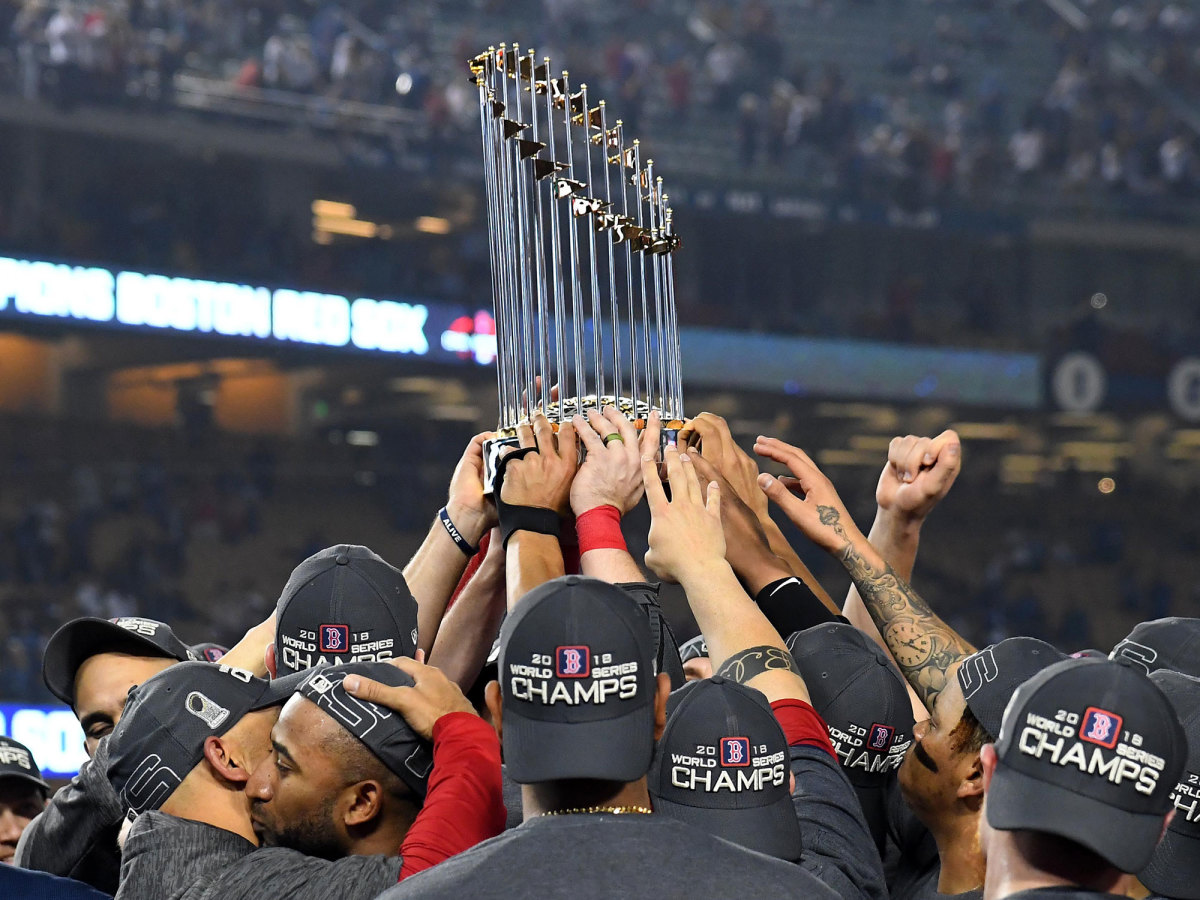MLB Reveals Red Sox' Cheating Scandal, Tainting Yet Another Championship Team
The 2018 Boston Red Sox officially joined the 2017 Houston Astros on Wednesday as MLB-certified cheats, giving taint to back-to-back world championship teams.
Baseball commissioner Rob Manfred concluded an investigation that began in January by finding Boston used its video replay monitor to decode opponents’ signs during the 2018 regular season, a violation of Major League regulations. As in his Houston decision, Manfred did not discipline players. He determined the scheme was operated by the team’s designated replay room operator, J.T. Watkins, who not coincidentally also served as the team’s primary advance video scout.
Manfred suspended Watkins without pay for the 2020 season and barred him from working as the team’s replay room operator in 2021. Watkins, 30, is a West Point graduate and former 10th-round pick of the Red Sox in 2012. He played three seasons in the Boston minor league system. He was teammates with Andrew Benintendi and Rafael Devers at Class A Greenville in 2015. Watkins denied any wrongdoing to MLB investigators.
The commissioner also took away Boston’s second-round draft pick this summer. (The draft is likely to be cut from 40 rounds to between five and 10 rounds.)
In a somewhat surprising development, in closing the book on the Houston investigation, Manfred imposed a similar penalty on former Astros bench coach Alex Cora as he did former Astros manager A.J. Hinch. Manfred suspended Cora “through the conclusion of the 2020 Postseason.” Hinch also was suspended beginning Jan. 13 and “ending on the day following the completion of the 2020 World Series.”
Cora played a far more active role than Hinch in the 2017 Astros sign-stealing schemes, including relaying signs through the banging of a trash can. But Manfred found that Hinch’s more senior position rendered him equally as culpable as his bench coach.
Dave Dombrowski, the Boston general manager in 2018 who was fired last year, was not disciplined. Manfred found that Dombrowski adequately informed all employees, including Watkins, of compliance rules and their importance.
The announcement came as baseball remains shut down due to the coronavirus pandemic, with no start to the season in sight. The timing of the report comes with built-in cover—just hours before what on a quiet sports landscape is one of the most eagerly awaited NFL drafts.
Watkins consistently denied to investigations that he violated MLB rules. Manfred disciplined him on evidence presented by up to 11 Red Sox players that portrayed him as using the replay monitor to decode signs.
Based on the report and a source with the Red Sox throughout 2018, the scheme worked this way: as the video advance scout, Watkins would pore over centerfield feeds of opposing catchers’ signs before a series, particularly with a runner on second base. Back then, before electronic sign stealing became so pervasive, catchers often used simple or the same set of signs with individual pitchers. (Sign sequencing has grown more elaborate since.) Such scouting was and is legal.
Watkins sat during games in front of the team’s replay monitor, which in 2018 carried the feed in real time. Armed with knowledge of sign patterns and tendencies, Watkins could notice if the expected sign sequences had changed. He could then pass that real-time information on to players—a violation of MLB rules.
Watkins denied acting on in-game information. But up to 11 players disagreed with his denial. When presented with their accounts, Watkins said they misunderstood his actions.
Players did use the in-game information with a runner at second base. They told investigators that they did not know obtaining and using such information was against the rules.

At Fenway Park the replay monitor was located in a hitting tunnel directly behind the dugout, within steps of players in the game. The same system was functional on the road, as well, because replay monitors for visiting teams typically are installed near dugouts.
Boston posted an .872 OPS with runners in scoring position in 2018—not only the best in baseball that year but also the best by any team in the previous 12 seasons. Manfred found no use of the monitor to decode signs in the postseason. Alerted by complaints by many clubs about the proliferation of sign stealing, MLB installed security officials near dugouts and around replay monitors during the 2018 postseason.
Still, Boston hit .364 with runners in scoring position in the postseason, up from .289 in the regular season. The MLB postseason average in those situations that year was .236. The Red Sox beat the Dodgers to win the World Series title, just as the Astros did the previous season.
Several Boston players had expressed confidence during the investigation that they would be exonerated. DH J.D. Martinez said, “there was nothing going on here.” World Series MVP Steve Pearce called the investigation “a joke.” Outfielder Andrew Benintendi said, “We didn’t do anything.” First baseman Mitch Moreland said, “There’s nothing they can come down on us for.”
Their confidence stemmed from carving out the replay monitor person as the isolated source of the violations rather than as a player-driven scheme.
“This team was next level with sign-stealing,” the team source said, referring to players’ aptitude and interest in legally decoding signs. “We were all over it … ‘chase the one, strikes plus one, outs plus one’ … whatever. Just about every team did that. Alex never once influenced us about that. Our mistake was probably having the advance guy as the replay guy.”
The Red Sox carried a payroll in 2018 of $240 million, far and away the highest in baseball. Their mistake, according to the source, was saving money to have one person work two jobs.
Cora, who was fired by the Red Sox after the release of the Houston report, could be back managing as soon as next season.
With Hinch, Manfred found that he was not an active participant and did not condone the violations but was disciplined for failing to stop it. The commissioner suspended Hinch without pay “beginning on January 13, 2020 and ending on the day following the completion of the 2020 World Series.”
Since that discipline was meted out, the pandemic has raised the possibility no 2020 World Series will be held. The spirit of Manfred’s decision was to allow Hinch to be reinstated around the end of October, though the commissioner has not addressed if the timetable would be amended if there is no baseball this year.
Manfred previously found Cora to be an active participant in the Houston scandal. His report in January found that Cora:
• Called the replay room via the dugout telephone to obtain information about signs. Both the use of the replay monitor to steal signs and the use of the dugout phone for such a purpose are violations of MLB rules.
• Arranged for a video room technician to install a monitor displaying the centerfield feed immediately outside the Astros’ dugout.
• Was the only non-player involved in the scheme in which the Astros banged on a trash can to signal the next pitch to the batter.
In summary, Manfred concluded in the Houston report, “Cora was involved in developing both the banging scheme and utilizing the replay review room to decode and transmit signs. Cora participated in both schemes, and through his active participation, implicitly condoned the players’ conduct.”

Manfred said in that Houston report he was withholding discipline on Cora until the conclusion of the Red Sox investigation.
The Red Sox are repeat offenders. In 2017 Manfred found them guilty of stealing signs off the replay monitor and transmitting them to the dugout via a smartwatch worn by a trainer. Watkins, the report said, also was involved in that scheme. The trainer would inform a player, who could then signal the information to a runner at second base, who could then signal to the hitter what pitch was coming. Boston escaped with only a fine then because Manfred had not officially warned clubs of penalties regarding the misuse of technology.
That episode prompted Manfred on Sept. 15, 2017 to put all club officials, managers and coaches on notice—not players—that such illegal behavior would be met with harsh penalties. A March 2018 memorandum from vice president Joe Torre to all clubs doubled down on that warning. The memo read in part, “To be clear, the use of any equipment in the clubhouse or in a Club’s replay or video rooms to decode an opposing Club’s signs during the game violates this Regulation.” (Boldface is original.)
While the Astros did not use the infamous 2017 trash can scheme in 2018, they deployed the same sign-stealing method that season as the Red Sox: using an advance scout to get signs from the replay monitor. Manfred’s report on the Houston scandal found that in 2018 “the Astros’ replay review room staff continued, at least for part of the 2018 season, to decode signs using the live center field camera feed, and to transmit the signs to the dugout through in-person communication.”
According to a person familiar with the report, many clubs by 2018 adopted a system similar to what Boston and Houston used: using an advance scout as the replay monitor control person.
Think of electronic sign stealing as an open stretch of highway. Before the September 2017 Manfred memo, there were no posted speed limits on the highway. The memo and the follow-up one from Torre became the speed limit signs. But in the 2018 regular season, teams saw there were no police patrols to enforce the limits. They figured MLB would have no way of knowing if they were in violation—at least not until MLB stationed security agents around clubhouses and monitors in that postseason.
Then last November, former Astros pitcher Mike Fiers told The Athletic how Houston used electronics to steal signs in 2017. In the course of launching that investigation, MLB learned about Boston’s scheme in the 2018 season. Shortly thereafter The Athletic reported on Boston’s possible violation.
Manfred said he could not accept rogue behavior on the grounds that other teams may have been engaged in similar behavior.
“I’m big on one for all, one for one,” Manfred told SI in January. “You do it for one club you have to do it for everybody. That’s particularly kind of poignant because I’m not interested in ‘other people were doing it’ as a defense. I’m interested in if other people were doing it, give me the information and I’ll investigate it. I’ll deal with that. If we buy into the idea that you can justify your own conduct based on the idea that somebody else was engaged in it we have chaos. And we’re not going to have chaos as long as I’m sitting here.”
